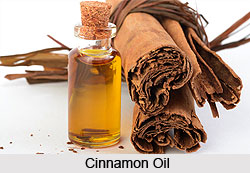 Cinnamon oil has various applications in aromatherapy. Cinnamon is widely known as Dalchini in India, and is used for food preparations. It is obtained from the bark and leaves of cinnamon trees. Cinnamon is widely grown in tropical countries of South America, West Indies and southern Asia. It is one of the best oils for circulation, especially during menopause, because it enhances circulation, it is very supportive of the heart. Cinnamon bark oil has a high percentage of aldehyde and is not recommended for use on the skin, as it can be irritating. Cinnamon leaf oil has a very low percentage of aldehyde and is more suitable for use in liniments or massage oils.
Cinnamon oil has various applications in aromatherapy. Cinnamon is widely known as Dalchini in India, and is used for food preparations. It is obtained from the bark and leaves of cinnamon trees. Cinnamon is widely grown in tropical countries of South America, West Indies and southern Asia. It is one of the best oils for circulation, especially during menopause, because it enhances circulation, it is very supportive of the heart. Cinnamon bark oil has a high percentage of aldehyde and is not recommended for use on the skin, as it can be irritating. Cinnamon leaf oil has a very low percentage of aldehyde and is more suitable for use in liniments or massage oils.
Properties of Cinnamon Oil
It has a sweet pungent taste and has heating or neutral energy. It acts as a stimulant, diaphoretic, aphrodisiac, antispasmodic, expectorant, analgesic, diuretic, alterative and carminative. It affects maximum on plasma, blood, muscle, marrow and nerves tissues. It mixes well with the oils like Cardamom, Orange, Nutmeg, Anise, Fennel and Trifola. However, it acts as a skin irritant and convulsive in high doses.
Uses of Cinnamon Oil
•Cinnamon is an excellent flavoring agent; so many people prefer adding cinnamon oil while they are cooking.
•It can be useful for parasites, scabies or lice.
•The aroma of cinnamon oil makes it a very effective as a room freshener.
Health Benefits of Cinnamon Oil
•It is good for heart.
•It improves digestion and appetite.
•It is empowering to the will.
•It works well in cold or sinus problems and menopause.
•It makes it a good brain tonic.
•It helps to remove nervous tension and memory loss.
•It improves sexual function and increases sexual desire.
•It helps to remove blood impurities.
•It helps to remove stiffness of the muscles and joints.
•It is useful for diabetic patients as it is capable of controlling blood sugar.
•It helps to destroy germs in the gall bladder.
•It reduces the risk of colon cancer.
•It can be applied to the skin. However, it is advisable to test the skin first, as sensitive skin types may react.




